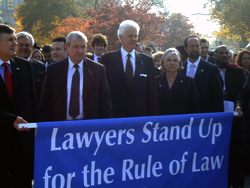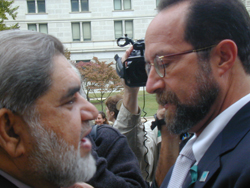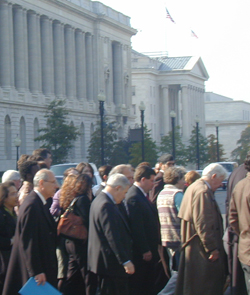Lawyers March in Solidarity with Jailed Pakistani Colleagues
ABA President Bill Neukom. Photos by Terry Carter
UPDATED: An estimated 600 lawyers marched on Washington Wednesday in solidarity with lawyers arrested in Pakistan.
They were among thousands of U.S. lawyers galvanized by photo and video images of Pakistani lawyers battling in the streets in protest of the state of emergency—de facto martial law—imposed by Gen. Pervez Musharraf.
In an unusual move, the ABA organized the street demonstration that took lawyers from the Library of Congress past the steps of the U.S. Supreme Court.
UPDATED: An estimated 600 lawyers marched on Washington Wednesday in solidarity with lawyers arrested in Pakistan.
They were among thousands of U.S. lawyers galvanized by photo and video images of Pakistani lawyers battling in the streets in protest of the state of emergency—de facto martial law—imposed by Gen. Pervez Musharraf.
ABA President Bill Neukom. Photos by Terry Carter
In an unusual move, the ABA organized the street demonstration that took lawyers from the Library of Congress past the steps of the U.S. Supreme Court.
“The diversity of the type of lawyers that attended was far greater than I expected,” says Nancy Prager, an intellectual property lawyer in D.C. “I only met one full-time human rights attorney, and she was from the ABA.” The rest, Prager says, were corporate attorneys, litigators, white-collar crime practitioners and defense lawyers.
Prager says she was moved to join the march when she heard of the crackdown in Pakistan. She wondered: “Would most lawyers stand up if they knew they could be at the receiving end of a bullet—not a brief?
“The solidarity that we showed was heartening.”

At the start of the rally, ABA President William H. Neukom spoke to a crowd of several hundred lawyers gathered at the entrance to the Law Library of Congress, many of them dressed in black business suits. The topic was Pakistan, and the jack-booted stomp on the rule of law Nov. 3 that sent thousands of lawyers and judges to jail, dismantling of the justice system at the order of strongman Gen. Pervez Musharraf.
A little more than a week ago, Pakistani lawyers put on dark business suits and went off to work at the courts, Neukom said, speaking without a PA system to the large crowd. But instead of meeting with clients there, they were met by police who beat them with batons and tear-gassed them before jailing thousands of them.
Near the end of his brief speech, Neukom shouted: “Today we will walk to court, and we will show our colleagues in Pakistan that we share their commitment to justice. We will show them that they do not stand alone.”
The file of lawyers, judges, law students and others stretched for more than a block, five or six in ranks shoulder to shoulder, though not with military precision, as they moved up Independence Avenue and across First Street, Southeast. It was then just another block to the U.S. Supreme Court. According to the ABA, the crowd swelled to 600.
Led by Neukom, ABA President-elect Tom Wells, immediate-past president Karen Mathis and other ABA leaders, they slowly passed by the court. Courthouse guards do not permit any groups protesting or rallying to come even onto the steps there, which were clogged at times today, as most days, with groups of high schoolers on field trips.
Neukom and his colleagues carried an ABA-blue banner proclaiming: “Lawyers Stand Up for the Rule of Law.” There were no speeches at the court. The quiet and orderly ranks of professionals in dark clothing, expressing strong protest against an attempt to stifle the rule of law, said everything by simply being there.
One of the marchers was a senior Pakistani lawyer who said he slipped out of the country and flew here from London last night. Mohammad Akram Sheikh, who is a former president of the Bar Association of Pakistan and a longtime member of the ABA and its International Law Section, said he came to rally support in this country not just for Pakistan’s lawyers, but to help pressure the Bush administration into pulling back its support for Gen. Musharraf.

Mohammad Akram Sheikh and Jeffrey Golden
“This march of lawyers will help overcome the negative image of the American administration that most of us feel is the reason for the problem right now in Pakistan,” Sheikh said in an interview at the staging ground. Musharraf cannot stay in power without help from the Bush administration, he says.
Sheikh goes far beyond recent estimates in news reports about the number of lawyers and judges jailed recently in Pakistan. He says that one-fifth of the nation’s 100,000 lawyers—as many as 20,000, have been detained. Many of them, he says, have been tortured and kept in isolation or solitary confinement.
Sheikh noted that while Pakistan has had military rule and dictatorship a number of times in its history—he says lawyers were lynched during upheaval in 1997 and that he barely escaped that fate—Musharraf’s rule has been the worst.
During his speech at the staging ground, Neukom called on Musharraf to restore the courts of Pakistan and release the jailed lawyers “who have been wrongly jailed for their lawful protest of his lawless actions.”
Gen. Musharraf had endeared himself to some Americans in September 2006 when he visited New York and appeared as a guest on cable television’s The Daily Show to promote his book. Neither faux news nor satire will likely ever restore the short-lived positive impact of that display of charm.
On Nov. 5, Neukom issued a statement on behalf of the ABA calling on Gen. Musharraf to “rescind these actions immediately,” calling them a “profound breach of the rule of law.”
Then, last Thursday, five days after Musharraf sundered Pakistan’s constitution, the Rochester, N.Y., legal community, led by the Monroe County Bar Association, rallied in support of Pakistani lawyers. On Friday, Neukom called for a similar march in Washington, D.C., on short notice with an even shorter but highly symbolic route on Capitol Hill. The march began at the Law Library of Congress and wended its way around the nearby Supreme Court building.

Other rallies and marches by lawyers sprang up around the country the past few days. As many as 100 lawyers met for a demonstration of solidarity with Pakistani lawyers at the Federal Building in San Francisco on Friday. They were called out by the Bar Association of San Francisco, the South Asian Bar Association of Northern California and the Criminal Trial Lawyers Association.
Several hundred lawyers, including plenty in black suits, turned out yesterday for a solidarity rally on the steps of the New York Supreme Court in Manhattan (which is the state’s principal trial court and a frequent set for NBC’s long-running Law and Order.) The rally was organized by the New York City Bar Association and the New York County Lawyers Association. A similar rally was held in Boston on Tuesday, and others were scheduled elsewhere today, including Seattle, where Neukom lives.
A number of state and local bar groups passed along Neukom’s statement of Nov. 5 denouncing Gen. Musharraf’s actions and called them out for local rallies, among them the Ohio Bar Association. All of them suggested black business suits with white shirts. The Austin (Texas) Bar Association asked its members to wear black suits and white shirts to work today.
In addition to the rallies and marches, more than a dozen local bar associations around the country have issued statements or passed resolutions supporting the rule of law in Pakistan.
One well-known legal blogger, Bob Ambrogi of LawSites, complained that the spate of activity by lawyers around the country is splintered and lacks organization. Two factors run against that view: the quick-moving time frame; and the old saw about herding lawyers being even more difficult than doing so with cats redoubles when it is literal.
It is almost unheard of in U.S. for large groups of lawyers to march in protest of anything.
“Lawyers can’t march, they don’t know how,” quips Susan Koniak, a law professor on leave from the Boston University School of Law. Koniak was instrumental in organizing, for the ABA, more than 100 lawyers from around the country in 1981 to protest President Ronald Reagan’s declared intention to dismantle the Legal Services Corporation.
They did not rally or march. Instead, Koniak and others working for then ABA President Reece Smith’s initiative, arranged carefully scheduled meetings, many of them simultaneous, with members of Congress. Teams of lawyers from every state met with congressional offices for every state, many of the meetings with the Congressional members themselves, Koniak says.
For the most part, the lawyers were prominent in their communities, many of them with big law firms, says Koniak, explaining that “we didn’t want to just send in a bunch of lefties.”
Marches on Capitol Hill are not novel. Organized labor and other groups have rallied thousands for various efforts.
“But I was told by a top staffer to Tip O’Neill (the late Democratic speaker of the House of Representatives) that our effort had a great impact on the Hill,” says Robert Evans, the recently retired head of government relations for the ABA. “He said that having that many lawyers coming in was a different kind of animal, very unusual.”
The LSC was saved, though it suffered deep budget cuts and curtailment of kinds of legal work permitted.
The crisis in Pakistan adds focus to Neukom’s signature effort this year as ABA president. He launched the World Justice Project, bringing in professionals worldwide from many disciplines to work on developing ways the rule of law can ensure communities of economic opportunity and social equity.
The project is developing a Rule of Law Index for measuring an individual country’s adherence to the rule of law and to pinpoint areas in which it is lacking. The WJP is expected to apply the index to 10 countries, including the U.S., by next summer. Then, at a World Justice Forum in Vienna, Austria, next July, 500 to 700 leaders from different professional fields will gather to discuss and debate related matters with the expectation of developing further, related, projects. Pakistan surely will be on the agenda, however the crisis plays out.
More march coverage:
Lawyers March for Pakistani Colleagues (Associated Press)
US lawyers urge freedom for imprisoned Pakistan attorneys (AFP)
Off Topic: Symbolic solidarity with the Pakistani legal community (Reasonable Balance)
Three chairs for Mr. Newkum (Saugoree)
Other rallies:
Hundreds Rally at Courthouse To Support Pakistani Attorneys (New York Law Journal)
Protest du Jour: Lawyers unite for Pakistan, again (Seattle Post Intelligencer’s Big Blog)
Michigan lawyers express solidarity with Pakistani law community (Daily Times)
Lawyers Rally in Support of Colleagues in Pakistan (New York Times)
NY lawyers, judges rally for besieged Pakistani colleagues (Associated Press)
OCU Law to hold vigils for imprisoned judges, attorneys (The Journal Record)
Originally Posted 10:07 a.m., CST. Updated at 3:26 p.m. to change the crowd estimate.



